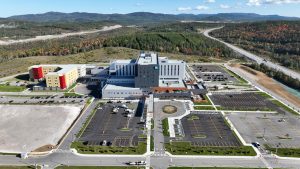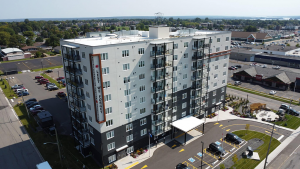Federal Finance Minister Chrystia Freeland reiterated her government’s recent headline focus on building millions of new homes as she delivered the Liberal government’s Budget 2024, a document titled Fairness for Every Generation.
Speaking in the House of Commons April 16, Freeland capped a three-week prebudget surge of escalating announcements on the housing file.
Said Freeland in her budget address, “The best way to make home prices and rents more affordable is to increase supply, and quickly. Budget 2024 lays out a strategy to unlock 3.87 million new homes by 2031.”
The budget explained that figure includes a minimum of two million net new homes on top of the 1.87 million homes expected to be built anyway by 2031. Of the two million net new homes, the government estimates that the policy actions taken in Budget 2024, Canada’s Housing Plan and in fall 2023 would support a minimum of 1.2 million net new homes.
Even with the new billions allocated to housing, Freeland was able to announce a slight improvement to the deficit outlook.
The deficit projection is expected to drop slightly from the $40.1 billion shortfall for 2023-24 in Budget 2023, moving slightly to $40 billion or minus 1.4 per cent of GDP. This improves to a $20 billion deficit in 2028-29, or minus 0.6 per cent of GDP.
Despite pre-budget requests by construction and engineering stakeholders, Freeland’s budget did not include any significant new infrastructure programs other than spending to enable new housing. The budget stated through the existing Canada Community-Building Fund and the Investing in Canada Infrastructure Program, the government expects to provide $56.1 billion from 2023-24 to 2033-34.
New role for Canada Lands
The budget stated: “We must use every possible tool to build homes at a scale and pace not seen since the Second World War.”
That search identified new roles for a variety of government entities.
Among them is Canada Lands Company, a federal agency. Over the next five years, the budget said, Canada Lands will oversee the construction of 29,200 new homes, with a minimum of 20 per cent affordable units.
“The government will spend $5 million over three years, starting in 2024-25, to support an overhaul of Canada Lands to expand its activities to build more homes on public lands,” the budget stated.
Freeland also announced a new Public Land Bank, tasked with taking an inventory of available lands before fall 2024 to accelerate construction on public lands.
The government will allocate $500 million over five years, starting in 2024-25, on a cash basis, to Public Services and Procurement Canada to launch a new Public Lands Acquisition Fund, which will purchase land from other orders of government to help spur mixed-market housing.
Canada Mortgage and Housing Corporation will also receive $112.6 million over five years, starting in 2024-25, and $4.3 million in future years, to top up the Federal Lands Initiative to open up more federal lands for affordable housing providers.
The government also announced it will recruit Canada Post in the hunt for new lands for housing. Six Canada Post properties are already being assessed for housing development potential, and the
government also intends to launch a new Canada Post Housing Program to support affordable housing providers, targeting Canada Post lands.
In addition, lands used by the Department of National Defence will also be considered for housing.
The government will also launch a new Public Lands Action Council this spring.
Housing: the supply side
As Budget 2024 put it, the government had a singular focus on “new measures to make the math work for homebuilders.”
New supply side initiatives include:
- introducing a temporary Accelerated Capital Cost Allowance for apartments that will increase the capital cost allowance rate from four per cent to 10 per cent on new purpose-built rental projects;
- expanding the plan to remove GST on rental housing to include the GST on student residences constructed by public owners;
- increasing the annual limit for Canada Mortgage Bonds from $40 billion to $60 billion;
- boosting the Apartment ��������ion Loan Program by $15 billion, as well as revising its terms of use for builders to improve its efficiency and streamline it;
- launching Canada Builds, a new program to leverage the Apartment ��������ion Loan Program to boost construction of rental homes through low-cast federal loans to be combined with provincial contributions, and targeting underused government or other lands;
- targeting builds on top of existing commercial buildings with a $100-million allocation of low-cost loans from the Apartment ��������ion Loan Program;
- launching the Historic Public Lands for Homes Plan, to work with other levels of government identifying underused public lands for new housing;
- offering low-cost financing to help homeowners add additional suites through a new Canada Secondary Suite Loan Program;
- offering further incentives to add density to existing homes through targeted changes to mortgage insurance rules;
- supporting more Indigenous housing with an increase in funding for homes and infrastructure in First Nations communities;
- supplementing the Housing Accelerator Fund with an additional $400 million; and
- launching a new $6 billion Canada Housing Infrastructure Fund to accelerate the construction of infrastructure supporting new housing development including duplexes, triplexes and other multi-unit apartments.
Innovative homebuilding supported
The government is also allocating $11.6 million to the development of its promised Housing Design Catalogue, offering builders and municipalities a set of standardized home designs, and it is creating a $50 million Homebuilding Technology and Innovation Fund to help commercialize innovative housing technologies such as modular and prefabricated homes.
Other incentives for builders to use modular techniques include allocating $50 million to the two regional development agencies to support modular housing, automation and robotics, and providing $500 million in low-cost financing for new apartments that use innovative prefabricated homebuilding techniques through the Apartment ��������ion Loan Program.
Follow the author on X/Twitter .












Recent Comments
comments for this post are closed